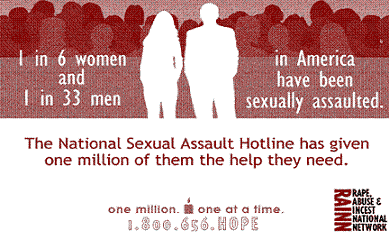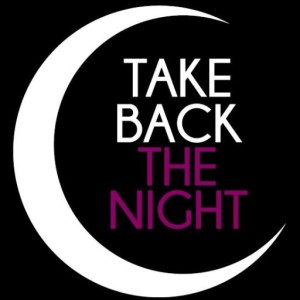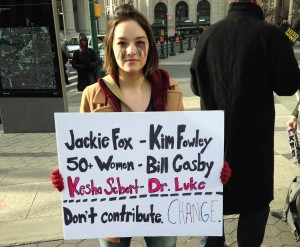April is Sexual Assault Awareness Month (SAAM)! In addition to taking part in International Anti-Street Harassment Week (April 10-16), here are 7 ideas for action in 2016.
1. Believe/help survivors. Believe survivors when they confide in you. Visit the website of the Rape, Abuse & Incest National Network to find information to help you help the survivor. And to find information to help yourself.
 2. Find help. If you are a survivor who isn’t sure where to turn to or how to get help, I highly recommend visiting the RAINN website. I volunteered with them for 2.5 years and applaud their work. You can find information about a phone or online hotline and information about recovery.
2. Find help. If you are a survivor who isn’t sure where to turn to or how to get help, I highly recommend visiting the RAINN website. I volunteered with them for 2.5 years and applaud their work. You can find information about a phone or online hotline and information about recovery.
* Do you identify as male? Visit the website 1 in 6 for resources specifically for you.
* Are you in the military? RAINN has a helpline called Safe Helpline specifically for survivors in the military.
3. Raise awareness on social media. The National Sexual Violence Resource Center provides a variety of resources each year for SAAM, including free reports and manuals and campaign materials. They also are running daily Instagram contests (#30DaysofSAAM) and have images you can post on your other social media accounts. April 5 is the SAAM Day of Action! Use tweets, posts, and status updates to share the word about #SAAM. Download their social media guide for specifics.
4. Wear jeans. Make a social statement by wearing jeans on April 27 as part of Denim Day in LA & USA. The day is a visible way to protest against misconceptions that surround sexual assault. Register today and raise awareness at your workplace, neighborhood, or community. Encourage each person who participates to donate one dollar to Denim Day to fund prevention programming.
5. Watch The Hunting Ground. This important Oscar-nominated documentary about campus sexual assault is now available for streaming on Netflix. Invite others to watch it (and schedule in some self-care time afterward as it’s an important but also upsetting film).
6. Order We Believe You. Annie C. Clark and Andrea L. Pino, the main subjects of The Hunting Ground film and founders of End Rape on Campus, have a new book coming out April 12, We Believe You: Survivors of Campus Sexual Assault Speak Out. It includes stories from “students from every kind of college and university―large and small, public and private, highly selective and less so―[who] share experiences of trauma, healing, and everyday activism, representing a diversity of races, economic and family backgrounds, gender identities, immigration statuses, interests, capacities, and loves. Theirs is a bold, irrefutable sampling of voices and stories that should speak to all.”
7. Use the arts or march. Take part or organize arts-based initiatives or a march to raise awareness about sexual assault. Examples of initiatives include:
 * Organize or participate in a Take Back the Night March in your community or on campus and make a statement that women have the right to be in public and to go about their lives without the risk of sexual violence. Order a kit with resources for the event.
* Organize or participate in a Take Back the Night March in your community or on campus and make a statement that women have the right to be in public and to go about their lives without the risk of sexual violence. Order a kit with resources for the event.
* The Clothesline Project, an initiative to bear witness to violence against women. Women affected by violence decorate a shirt and hang the shirt on a clothesline to be viewed by others as testimony to the problem of men’s violence against women.
* V-Day event offers several performance and film screening options for groups to implement in their community in February, March, and April. The purpose of these events is to raise awareness about violence against women and girls as well as raise money for local beneficiaries that are working to end violence. There is no theater or producing experience necessary. Visit the V-Day website to learn how to organize a V-Day event.
* Story of a Rape Survivor (SOARS) is an award winning multimedia performance from A Long Walk Home you can bring to your community that entertains as well as educates the audience about sexual assault prevention. Featuring the music of Nina Simone, Maxwell, and Sade, SOARS tells one woman’s story about how she reclaimed her body, sexuality, and self-esteem after being sexually assaulted in college. SOARS is a cutting-edge theatrical experience that stars a diverse cast of women, combining photographs, dance, spoken-word poetry and music as a way to educate about healing from sexual violence.
* By wearing a white ribbon, White Ribbon Campaign members make a personal pledge to “never commit, condone or remain silent about violence against women and girls.” You can order materials to help challenge the community to speak out on the issue, learn about sexual violence, and raise public awareness.
(And if you’re unsure about the connection between street harassment and sexual assault, listen to a CALCASA Prevention podcast or watch a video where I talk about the connections. Briefly, some of the connections are that both behaviors fall on the same spectrum of gender violence; street harassment sometimes escalates into sexual violence; and street harassment can be re-triggering for survivors of sexual abuse.)



